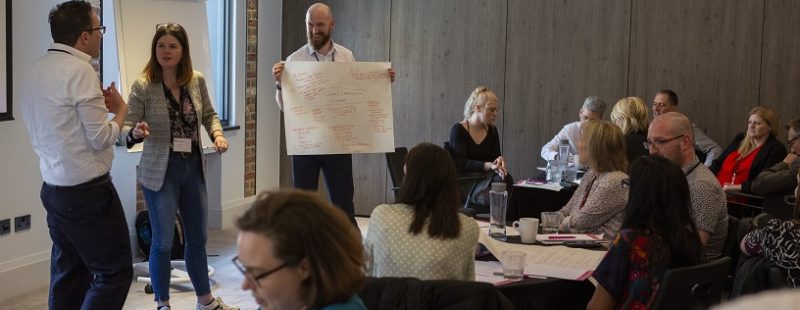We recently held a workshop at the Loneliness Action Group conference, which was hosted by the British Red Cross and Coop. Here we share some key learnings from the day on how businesses can tackle loneliness.
“Forward thinking businesses have led on many major social changes”
Forward thinking businesses have led on many major social changes. They have helped break down discrimination on the basis of gender, race of sexuality. Many offices were at the forefront of the movement to end smoking in workplaces. More recently, some employers and business leaders have led the way in destigmatising mental ill health.
Loneliness, too, is an issue that needs a response from all parts of society. That’s why the Campaign to End Loneliness and the Department for Business, Energy and Industrial Strategy established the Loneliness Employers Leadership group, as part of the cross-government Loneliness Strategy. It was set up to feed into the implementation and development of the government’s work on loneliness. It is also designed to deepen understanding of what is happening in the workplace to address loneliness and well-being.
Loneliness Action Group
As part of this we ran a workshop at the Loneliness Action Group conference a couple of weeks ago. We brought together around 30 people working either in businesses, with business or seeking to understand more. The employers group already has over 25 signatories, so there is a good deal of work already happening. This was a chance to reflect on that progress and work out what happens next.
The employers group categorise the work that businesses do as employers to address loneliness into three areas:
1) Culture and infrastructure,
2) Job design
3) People and networks.
We wanted to find out if this captures what businesses are doing. This meant we particularly pleased that on the day people thought these distinctions made sense. It set off lots of lively conversations about concrete actions as well as the general approach.
Approach to loneliness
In terms of the overall approach to loneliness, we found that in many ways the issues were common across both public and private sectors. An important point is that leadership from the top is vital in making a difference and for that we need to make a case that works in business terms. It should show the evidence base for action alongside clear examples of steps to take. This approach needs to be about assets rather than deficits.
There were a number of concrete actions suggested. These included public organisational leadership alongside awareness campaigns to tackle stigma. There is a role for training to help people identify loneliness. It is important to be aware that loneliness may not be the presenting issue. As well understanding that the nature of some jobs may put employees at particular risk of experiencing loneliness. Employees can also help drive action. They can create networks and other ways of coming together around shared interests or concerns.
We also asked participants how businesses can work with people who are not employees but in the wider community. The very useful feedback we received is that making an impact in the community is not just about customers – they can be people who engage in other ways. For example, if a firm is redeveloping a neighbourhood, they can create spaces that encourage social connections.
Looking forward, there was a suggestion that we could bring together ideas sector by sector. For example, cafes, retail, construction or utilities. In this way loneliness can be everybody’s business, and we can all work towards a society where no one is chronically lonely.
Next steps
Thank you to all those who participated in this productive and inspiring workshop. Particular thanks to the employer who signed up the group after the meeting! The ideas gathered will all feed into the future work of the employers group. We will publish these towards the end of this year.
Thanks to the Red Cross and the Coop for hosting conference on behalf of the Loneliness Action Group, and for letting us reproduce these photos from the day.





No comments on this article yet. Please feel free to submit a comment below.
By submitting a comment you grant Campaign to End Loneliness a perpetual license to reproduce your words and name/web site in attribution. Inappropriate and irrelevant comments will be removed at an admin's discretion. Your email is used for verification purposes only, it will never be shared.